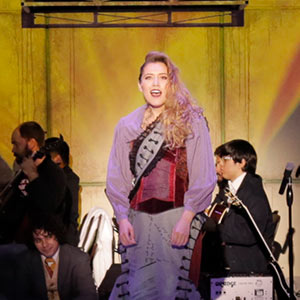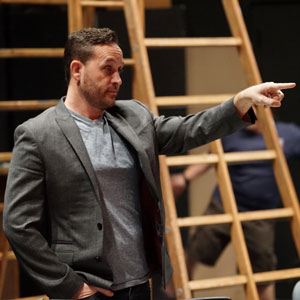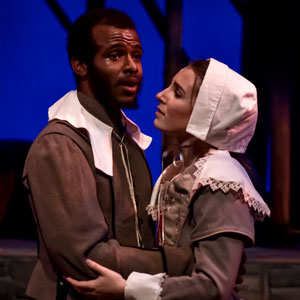'Much Ado About Nothing' reveals a comical edge
— Fullerton College Hornet - Katrinia Bartsch - Wednesday, October 13th, 1999
The Theatre Arts Department is producing Shakespeare's Much Ado About Nothing, set for release in mid October and directed by Gary Krinke and Arlyn McDonald.
'Much Ado About Nothing', is a comedy based upon the information gained by characters while eavesdropping. Of course, the dialogues become twisted by the listeners and result in many romantic mix-ups.
Included in the-play is a mock funeral, an interrupted wedding, the resurrection of a "dead" character, numerous puns, practical jokes and love at first sight.
All characters are diverse and witty or bumbling and idiotic, ranging from friars to playboys and smart-alecks.
While many Elizabethan plays were written in blank verse, Much Ado About Nothing is written mainly in prose, as is common in Shakespearean comedies.
Prose has been decided as the best way to allow the characters to deny or proclaim their love, for one< another.
The play's background is the ending of a war where Don Pedro, Prince of Arragon, has defeated his
half-brother, Don John, in war but the two have made up afterwards. Coming back from the war with Don Pedro " are two of his friends Claudio, a young man from Florence, and Benedick from Padua, both men having performed bravely n the fighting. Beatrice, Leonato's niece, is concerned about Benedick, a former lover, although she does not admit it.
Opening with a war of wits between Benedick and Beatrice, this production illustrates two self-proclaimed enemies who seem to be very attracted to one another. Claudio falls head over heels in love with Hero, while Benedick, Claudio's friend, renounces love.
Don John, the play's villain, is determined to thwart Claudio's advances on Hero because he believes him to be a "young start-up" who "hath all the glory of my overthrow."
At a masked ball hosted by Beatrice's father, Beatrice and Hero discuss men and the fate of old maids as Beatrice scoffs at the idea of marriage.Disguised couples are the subject of mistaken identities, and marriage intentions are misconstrued.
Meanwhile, Benedick's friends, Leonato, Don Pedro and Hero, hatch a plan to make Benedick and Beatrice fall back in love and marry
In the duration of the comedy the characters start to understand the lies they have created and can begin to make sense of the emotions they feel.
As a whole, Much Ado About Nothing has been a popular comedy since the close of the sixteenth century and continues to be one of the most often aced Shakespearean plays.








